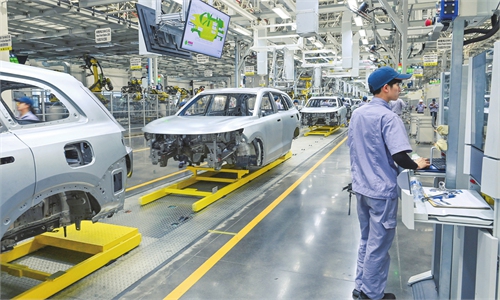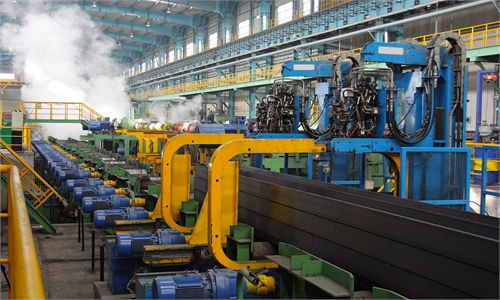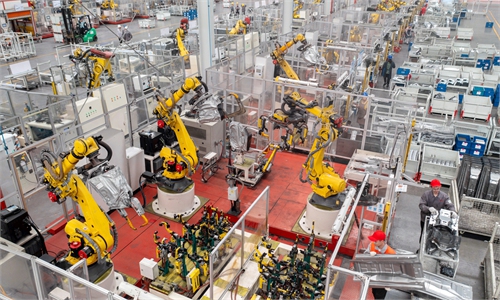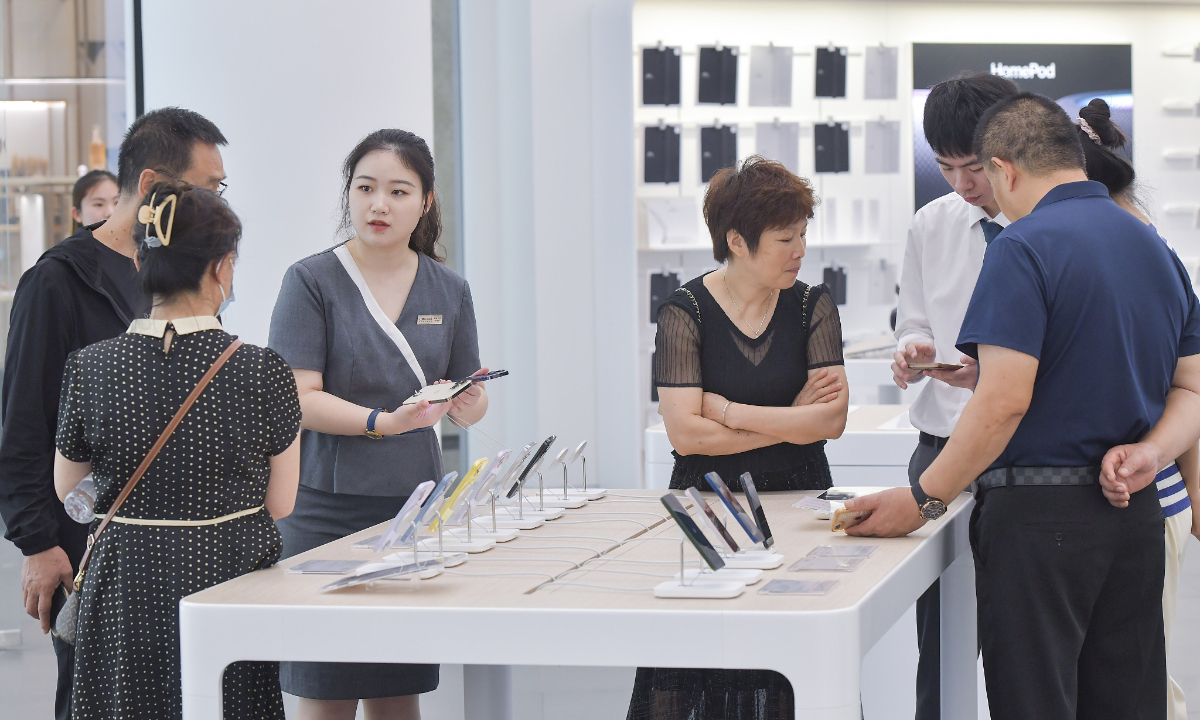
Photo:VCG
Chinese policymakers, ranging from the State Council and top economic planner to the commerce ministry and the central bank, have been intensively launching stimulus measures to boost consumption and rejuvenate growth momentum over the past week, moves that are seen as a pivot for bolstering the nation's continuous economic recovery and also critical for the world as it encounters lingering headwinds.
Observers noted that the slew of measures are carefully drafted, widely applying to all sides concerned and could form a compounded effort in boosting the nation's growth. For instance, boosts for automobiles and electronics products consumption are close to people's daily life, the promotion of artificial intelligence appliance is in line with the nation's determination to promote high-quality growth, and the heavyweight guideline to spur the private economy has injected much-needed confidence into the domestic market.
They will further consolidate the foundation for the recovery of the world's second-largest economy, observers added, noting that with more broad-based stimulus to kick in over the next few months, recovery will continue to pick up pace, though challenges remain.
The growth from China will bring opportunities and stability for the world, a stark contrast to the US, which is obsessed with geopolitical fighting and is eager to maintain hegemony rather than a pursuit of common growth for the world, they said.
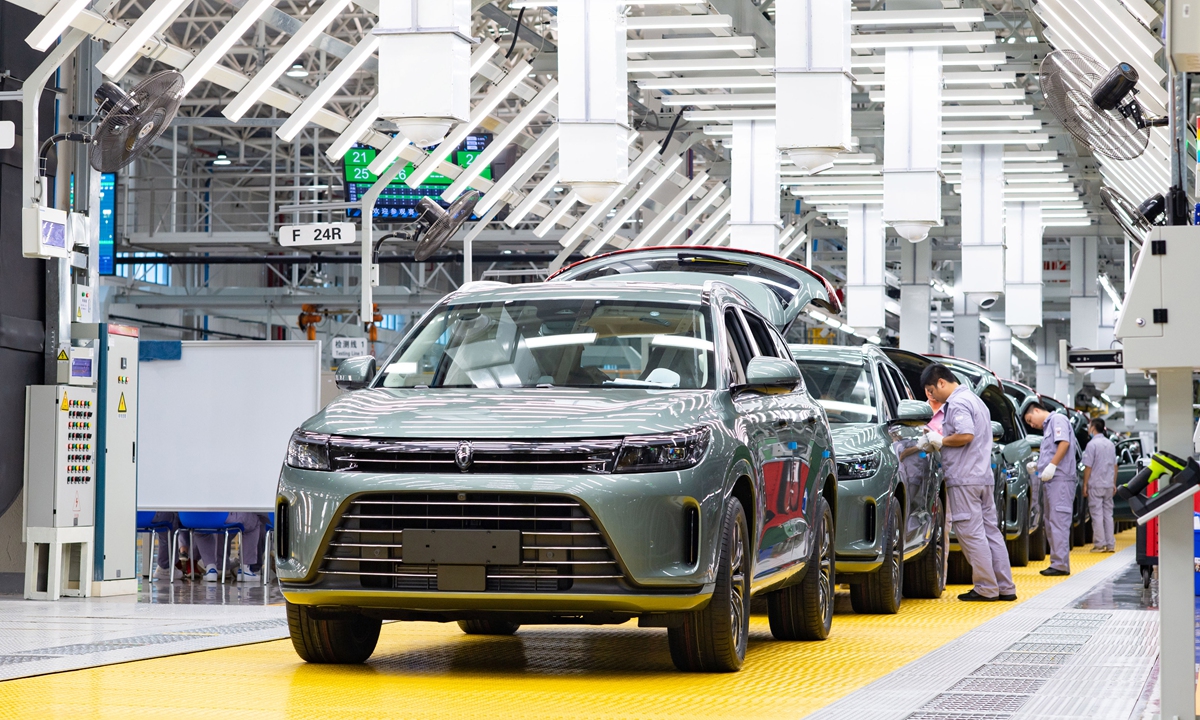
An NEV manufacturing line in Southwest China's Chongqing Municipality Photo: VCG
Policy package
In the latest move to shore up consumption, China on Friday freshly announced steps to boost sales of cars and electronics - two areas in which the nation has vast potential.
Regions will be encouraged to increase annual car purchase quotas and efforts will be made to support sales of second-hand vehicles, the National Development and Reform Commission (NDRC) said in a statement on automobile consumption.
A separate statement on supporting sales of electronics products said authorities would encourage scientific research institutes and market entities to actively apply domestic artificial intelligence (AI) technology to improve intelligence levels of electronic products, with a particular focus on rural areas.
In recent years, the demand for electronic products has been slow to pick up due to various reasons such as uncertain income expectations due to the pandemic, slower innovation, and disruptions in global supply chains. However, China's strong income levels and network infrastructure indicate that there's still great potential in the market. The increasing trend of smarter products is driving upgrades in consumption, and even rural areas hold significant untapped opportunities, NDRC official Chang Tiewei explained at a press conference introducing the policies on Friday.
To boost consumption, policymakers are considering ways to make electronic products smarter and more user-friendly by using the latest technology like AI, Chang said, explaining that they are planning to invest in technology that recognizes different regional dialects and accents, making voice control features more efficient and accessible to people in rural and older communities.
These efforts aim to reduce the digital gap, make electronic products more accessible and beneficial to all residents, regardless of their location or background. As the country moves forward, these steps may shape a more advanced and inclusive electronic products market, the official said.
In another conference held by the Ministry of Agriculture and Rural Affairs on Friday, Zeng Yande, an official with the ministry vowed further efforts to "fill farmers' wallets", saying that only with a stable income can people in rural areas "dare to consume."
The two policies from two ministries form a virtuous circle to boost rural consumption, with a support for both the demand and supply sides, and serve as an example of how the nation boosts its economic growth with a sustained growth drive, Zhang Hong, an independent analyst on macro economy, told the Global Times on Friday.
Potential in economic drivers such as the new generation of AI follows years of the central government's efforts to build internet infrastructure even in the most remote areas of China, and will provide sustained growth drive for consumption, Zhang said.
Moreover, Zhang pointed out that China's innovative policy tools are also completely different from those of Western countries, which some foreign media fail to understand.
On the macro level, China on Wednesday issued a guideline on boosting the growth of the private economy, highlighting that it will ensure that enterprises of different ownership will operate in an arena of fair competition and be protected by the law equally.
On Thursday, China raised a key parameter in its macro-prudential management to allow domestic firms to take on more foreign debt, a renewed effort to stabilize the yuan, which in turn will shore up confidence and support the real economy by coordinating domestic and international resources.
Other supportive measures will soon follow, and some policies rolled out in the first half, such as infrastructure investment, will also take effect in the coming months, Cong Yi, dean of the School of Marxism at Tianjin University of Finance and Economics, told the Global Times on Friday.
Pie for all
However, going forward, major challenges are likely to remain, and the challenge is not only faced by China, but also the world, said officials and economists. Nevertheless, China might be one of the nations that can hold the rudder most steadily amid the turmoil.
According to freshly released data, China's second-quarter GDP jumped 6.3 percent, falling short of expectations, but outpaced most of the world's major economies to become the locomotive of global growth.
In the first quarter, the US, EU, Japan and Brazil reported GDP expansion of 1.8 percent, 1 percent, 1.9 percent, and 4 percent respectively. This means that even taking into account the second-quarter reading, China's first-half GDP growth still leads major global economies, according to the National Bureau of Statistics (NBS) on Monday.
Compared with the US, with its crackdowns, containment and protectionist approach that continues to drag down the global economy, China has been sticking to an opening-up approach with global investors while striving to maintain its own growth momentum, Cong said.
On Friday, the Ministry of Commerce held a special policy interpretation and communication roundtable for foreign business associations, a mechanism that will become a regular fixture as the world's second-largest economy is committed to creating a fair, transparent and predictable business environment for foreign firms.
China will formulate comprehensive policies to further attract foreign investment, expand market access and enhance communication with foreign firms and chambers of commerce, in a bid to set up a higher-level opening-up system and attract global resources, Jin Xiandong, an NDRC official, said during a press conference on Tuesday.
In the longer term, the country will continue to provide strong impetus for the recovery and growth of the world economy, and will surely bring more permanent development opportunities for foreign enterprises, Jin noted.
"There is indeed some pessimistic sentiment across the market, which is affected by a complex external situation, foreign media hype about the loss of momentum in the Chinese economy and US politicians' continuous call for decoupling from China," Cong said.
But that's not the whole picture: more foreign enterprises and CEOs of global giants have been visiting China, and more are expanding their footprints in the nation, which demonstrates confidence, the expert said.
In mid-June, US memory chip giant Micron Technology said it will invest over 4.3 billion yuan ($603 million) in its packaging and testing plant in Xi'an, capital of Northwest China's Shaanxi Province, in the next few years, a move that the company said "showcased its unswerving commitment" to Chinese business and team members.
The company previously failed to pass China's cybersecurity review, which fuelled malicious speculation of a "tit-for-tat" amid frosty China-US bilateral relations.
"We should have the confidence that with policymakers being fully sober about the challenges ahead, and sufficient policy tools in hand, China can be the 'most stable' one in the face of the hardest headwinds," Cong said.
